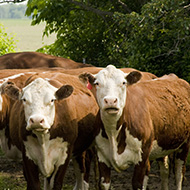Beef cattle farmers sought for survey

"Obtaining information on veterinary medicine use will enable us to see what parasites and pathogens are most prevalent" - Dr Hayward.
A study exploring patterns of veterinary medicine use in UK beef cattle is seeking beef cattle farmers across the UK to take part in a survey.
Undertaken by the Moredun Research Institute in collaboration with Scotland's Rural College (SRUC), the study aims to understand patterns of veterinary medicine use in beef cattle and work out how treatments are linked to production efficiency.
Ultimately, it is hoped that this will shed light on the most important diseases affecting UK beef producers, when and where they are most prevalent and how much they are affecting production.
Dr Adam Hayward, from Moredun, explained: “Obtaining information on veterinary medicine use will enable us to see what parasites and pathogens are most prevalent, and where and when they are occurring.
“By linking this to animal performance data we will also gain a better picture of the cost of these diseases to the industry and how we can target interventions.”
The information needed includes treatments each animal has been given, along with the date and reason for treatment. Researchers would also appreciate additional information such as breed, age and sex.
SRUC's Carol-Anne Duthie said: “We are excited to be working alongside colleagues from Moredun on such an important issue. Through direct engagement with the farming sector, the project will provide a clearer understanding of the key disease challenges affecting Scotland’s beef sector and their economic impact”.
Beef cattle farmers are welcome to sign up to the survey at any point within the survey's ongoing two-year period, and there is no upper limit to the number of participants.
Further information can be obtained by contacting Dr Hayward at adam.hayward@moredun.ac.uk



 The RCVS has announced a new version of its 1CPD mobile app, with enhanced features for veterinary surgeons and veterinary nurses to record their continuing professional development.
The RCVS has announced a new version of its 1CPD mobile app, with enhanced features for veterinary surgeons and veterinary nurses to record their continuing professional development.